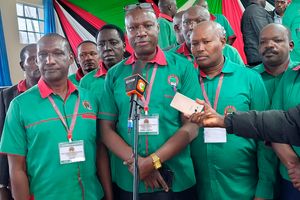
The Teachers Service Commission Acting CEO Eveleen Mitei. The TSC has asked teachers' unions for more time to consult other state entities on the CBA demands.
The Teachers Service Commission (TSC) has established a policy for the promotion of teachers that provides for their automatic progression within common cadre grades, without the need for competitive interviews.
The policy will apply to three categories of teachers, including certificate holders (commonly referred to as P1), diploma and bachelor’s degree holders. According to the policy, teachers joining service at Grade B5 will be eligible for automatic promotion to Grade C1 after serving a minimum of three years, subject to satisfactory performance.
Teachers serving in Grade C1 are eligible for automatic promotion to Grade C2 upon completion of three years of service, subject to satisfactory performance, while those serving in Grade C2 qualify for automatic promotion to Grade C3 after three years of service, subject to satisfactory performance.
“P1 Certificate Holders: Teachers appointed at Grade B5 are eligible for automatic promotion to Grade C1 after serving a minimum of three years, subject to satisfactory performance,” said TSC.
While responding to the Committee on Education of the National Assembly, TSC said diploma holders who are teachers serving in Grade C1 are eligible for automatic promotion to Grade C2 upon completion of three years of service, subject to satisfactory performance.
Automatic promotion
“Bachelor’s degree holders; teachers serving in Grade C2 qualify for automatic promotion to Grade C3 after three years of service, subject to satisfactory performance,” said TSC.
The teacher's employer further added that it has put measures in place to ensure that teachers are absorbed while at their prime age in order to maximise on their long-term teaching expertise.
“TSC recruits registered teachers by the recruitment guidelines issued from time to time. The available vacancies are advertised based on the demand for and supply of teachers as per the existing establishments and budgetary provisions,” said TSC in their response.
The employer further said that the recruitment process is guided by the principles of fair competition and merit, integrity, transparency and accountability, equity, fairness and impartiality, inclusiveness and non-discrimination.
In the spirit of equity and fairness, TSC said it distributes recruitment vacancies equally among the 47 counties. However, the commission said the recruitment scorecard is developed inclusively to consider items such as professional qualifications, age, and length of stay since qualification as a teacher and CBC upgrade.
TSC said it ensures that it considers both teachers who graduated in the early years and have applied for recruitment and their counterparts who recently graduated.
“Existing policies on the maximum number of schools per region, ward or area and how the policies influence teacher recruitment and deployment to ensure equitable distribution of teachers in all schools,” said the teachers' employer.
The teacher's employer has developed a Teacher Recruitment Policy that governs the recruitment process to ensure that the process is carried out in a lawful manner and within the tenets of rights and freedoms encapsulated under the Constitution.
“The key principle driving recruitment and deployment of teachers is that the Commission is an Equal Opportunity Employer that abides by the tenets of the law espoused under the Constitution, the TSC Act, the Employment Act, the National Cohesion and Integration Act among other pieces of legislation,” said TSC.

Teachers Service Commission (TSC) Headquarters in Upper Hill, Nairobi on June 21, 2025.
TSC said the policy is informed by the values and the principles of public service that include fair competition and merit, transparency and accountability, equity, fairness and impartiality, inclusiveness, and non-discrimination.
The recruitment procedure ensures that there is stability and continuity in the teaching sector. The process of teacher recruitment begins with the identification of vacancies, which will be determined by existing vacancies arising out of teacher shortages or vacancies arising from teacher exits.
Thereafter, the vacancies are distributed proportionally to counties and sub-counties, ensuring that each region receives a fair share of opportunities based on needs and available positions.
Once the vacancies have been identified and approved based on the available budget, the demand and supply of teachers and the existing establishments, the commission advertises the vacancies in the print media and through the commission’s website.
“During this period, the teachers apply online via the TSC recruitment portal. Once the application period is over, the commission invites the shortlisted teachers for verification of academic certificates and other relevant documents at the sub-county offices or school level,” explained TSC.
The interviews are decentralised Pursuant to Article 6(3) of the Constitution, to improve service delivery at the grassroots level.
The interviews are conducted at the sub-county or school level, enabling access and regional representation.
TSC said the approach facilitates wider participation from candidates across all counties and minimises logistical and financial barriers for applicants from remote areas.
“A uniform interview scoring guide is applied across all regions. This standardization promotes consistency, fairness, and transparency, ensuring that candidates are evaluated solely on merit,” said TSC.
TSC said it ensures schools in Arid and semi-arid lands and hard-to-staff areas are well-staffed with teachers.
“Where an advertisement does not attract applicants due to lack of subject combination, consideration is given to the next available applicant,” said TSC.
Teacher recruitment deliberately takes into account gender balance, persons with disabilities and the inclusion of marginalised groups.
For instance, a total of five per cent of all advertised vacancies are reserved for PWDs. To foster regional balance and promote retention, TSC further prioritises the recruitment and deployment of teachers within their home counties during recruitment.
TSC said it also considers a report on the recruitment criteria of teachers based on school demographics, indicating whether the student population and school needs.
The commission has adopted a data-driven and equitable demand-driven formula to distribute vacancies across the country based on the subject area/class shortages against the school population.
The method considers both the student population and school needs.
“Recruitment is often tailored to address shortages in specific subjects such as science, technology, engineering and mathematics (STEM), Arts, Technical and Special needs Education,” said TSC.








